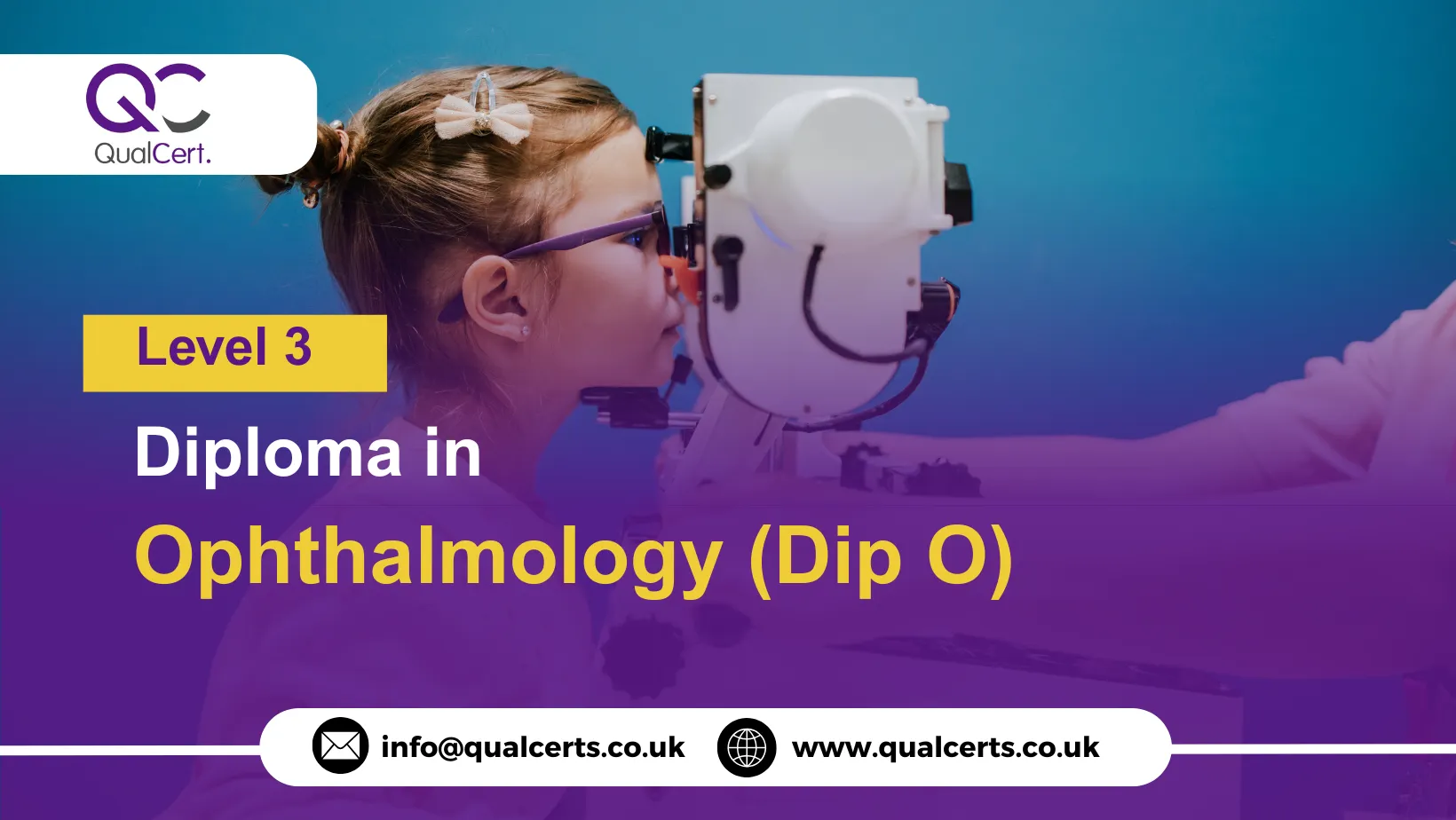The QualCert Level 3 Diploma in Ophthalmology (Dip O) is a UK-accredited programme designed to provide learners with a comprehensive understanding of eye health, ocular anatomy, and common ophthalmic conditions. The course equips learners with the theoretical knowledge and practical insights required to support eye care and ophthalmic services effectively.
This diploma covers essential topics including eye structure and function, visual system physiology, common eye disorders, and diagnostic assessment methods. Learners also explore patient-centred care, ethical and legal considerations, and the application of evidence-based practices in ophthalmology.
The programme is designed to prepare learners for professional roles in clinical support, healthcare settings, and community eye care services. Learners gain practical awareness of assessment techniques, patient communication, and the management of common ophthalmic conditions.
By completing this diploma, learners develop the skills, knowledge, and professional awareness necessary to enhance patient outcomes, support healthcare teams, and advance their careers in eye care and ophthalmic practice.
The QualCert Level 3 Diploma in Ophthalmology (Dip O) provides learners with comprehensive knowledge of eye health, visual system physiology, and common ophthalmic conditions. Combining theoretical understanding with practical skills, this diploma prepares learners to work confidently in clinical and healthcare settings, supporting patient care and eye health services.
Course Contents of QualCert Level 3 Diploma in Ophthalmology (Dip O):
The QualCert Level 3 Diploma in Ophthalmology (Dip O), offers 60 Credits, requiring a Total Qualification Time (TQT) of 300 hours, including 210 Guided Learning Hours (GLH).
| Unit Ref# | Unit Title | Credit | GLH | TQT |
| QC27139-1 | Anatomy and Physiology of the Eye and Visual System | 10 | 35 | 50 |
| QC27139-2 | Common Ophthalmic Conditions and Patient Assessment | 10 | 35 | 50 |
| QC27139-3 | Diagnostic Procedures and Clinical Examination Techniques | 10 | 35 | 50 |
| QC27139-4 | Management, Treatment, and Preventive Eye Care Strategies | 10 | 35 | 50 |
| QC27139-5 | Patient Safety, Risk Management, and Professional Standards | 10 | 35 | 50 |
| QC27139-6 | Evidence-Based Practice and Professional Development in Ophthalmology | 10 | 35 | 50 |
Entry Requirements for the QualCert Level 3 Diploma in Ophthalmology (Dip O):
To enrol on the QualCert Level 3 Diploma in Ophthalmology (Dip O), learners must meet the following entry requirements:
Minimum Age
Learners must be at least 16 years old at the time of enrolment.
Educational Background
A minimum of a Level 2 qualification (or equivalent) is recommended. Learners without formal qualifications may be accepted based on relevant experience or prior learning.
Experience
No prior experience in ophthalmology is required, although an interest in healthcare, eye care, or patient support is encouraged.
Language Proficiency
Learners must demonstrate sufficient English language proficiency to fully engage with course materials, participate in assessments, and communicate effectively in practical or discussion-based activities.
Learning Outcomes for the QualCert Level 3 Diploma in Ophthalmology (Dip O):
Anatomy and Physiology of the Eye and Visual System
- Understand the structure and function of the eye and associated visual pathways.
- Explain the physiological processes involved in vision, including light perception and signal transmission.
- Recognise the relationship between ocular anatomy and overall visual health.
- Identify factors affecting normal and abnormal visual function.
Common Ophthalmic Conditions and Patient Assessment
- Identify common eye conditions such as glaucoma, cataracts, refractive errors, and macular degeneration.
- Recognise symptoms, risk factors, and clinical presentations of ophthalmic disorders.
- Apply patient assessment techniques to gather relevant clinical information.
- Develop patient-centred approaches to care and management.
Diagnostic Procedures and Clinical Examination Techniques
- Understand the principles and applications of ophthalmic diagnostic tests.
- Conduct basic ocular examinations and interpret findings.
- Apply clinical assessment techniques to support diagnosis and treatment planning.
- Recognise the importance of accuracy, safety, and hygiene in diagnostic procedures.
Management, Treatment, and Preventive Eye Care Strategies
- Understand treatment options and clinical management for common eye conditions.
- Apply preventive strategies to maintain eye health and prevent complications.
- Support patients in following treatment plans and lifestyle modifications.
- Recognise the importance of monitoring, follow-up care, and patient education.
Patient Safety, Risk Management, and Professional Standards
- Identify risks associated with ophthalmic procedures and patient care.
- Apply risk assessment and management strategies to reduce harm.
- Understand ethical and professional standards in ophthalmology practice.
- Promote patient safety, dignity, and quality of care.
Aspiring Healthcare Professionals
Individuals seeking foundational knowledge in ophthalmology to support a career in healthcare, nursing, or allied health professions.
Clinical Support Staff
Healthcare assistants, support workers, and allied health professionals wishing to enhance their understanding of eye health and ophthalmic conditions.
Students Preparing for Higher Education
Learners preparing for higher-level qualifications in medicine, nursing, biomedical sciences, or vision science.
Personal and Professional Development
Individuals interested in developing knowledge, skills, and professional awareness in ophthalmology and patient-centred eye care.
The Centre Requirements for QualCert Level 3 Diploma in Ophthalmology (Dip O):
Qualified Tutors
- Tutors must hold relevant academic qualifications (Level 4 or higher) in medicine, nursing, ophthalmology, or a related healthcare discipline.
- Tutors should have practical experience in eye care and experience in teaching or supervising learners.
Learning Resources
- Centres must provide access to textbooks, journals, digital resources, case studies, and current research in ophthalmology.
- Learners should have opportunities to apply evidence-based guidelines and best practices.
Facilities and Support
- Centres must provide suitable facilities for guided learning, workshops, and practical assessments.
- Online delivery should be supported by a secure, interactive platform with reliable access for learners.
Assessment Standards
- Centres must adhere to QualCert’s quality assurance procedures.
- Assessments should be fair, transparent, and aligned with qualification standards.
Student Support
- Academic guidance should be available for coursework, practical assessments, and progression pathways.
- Pastoral support should be provided to ensure learner engagement and wellbeing.
- Learners should receive advice on further education and career development opportunities in ophthalmology and eye care.

